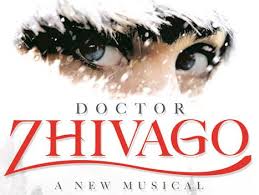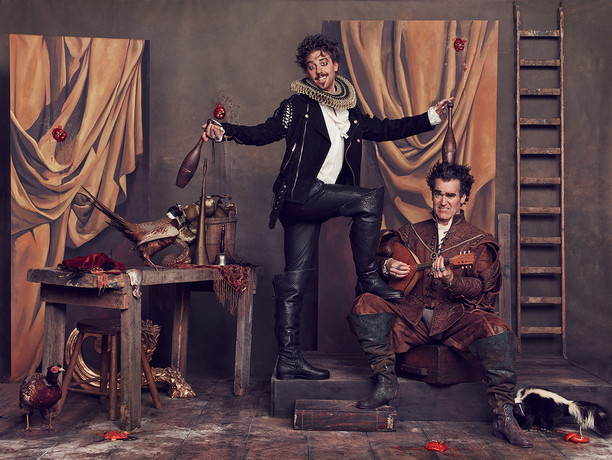 Does the classic film / novel translate well to the stage? Stage Door, our theater review series, is in hyperdrive, it's difficult to keep up what with shows opening left and right. The Tonys, like the Oscars, have a glut problem right before the eligibility deadline. Nominations are announced this coming Tuesday.
Does the classic film / novel translate well to the stage? Stage Door, our theater review series, is in hyperdrive, it's difficult to keep up what with shows opening left and right. The Tonys, like the Oscars, have a glut problem right before the eligibility deadline. Nominations are announced this coming Tuesday.
The Twin Perils of Snark & Earnestness
If you want to be a massive musical comedy hit, the current fever is to be slightly self-deprecating about the thing that you are. Something Rotten, which is expected to do well at the Tonys and already a hit, is a new musical comedy that doubles as an anachronistic in-on-the-joke Shakespeare comedy and a spoof of Broadway song & dance. The actual plot centers around a poor playwright (Tony-winner Brian d'Arcy James) with the surname of "Bottom" -- and yes, that leads to exactly the crass jokes you might expect it does -- who struggles in obscurity while his contemporary William Shakespeare (Tony-winner Christian Borle from Smash doing a full Tim Curry) is treated like a rock star.
More Something Rotten and a new Doctor Zhivago after the jump...
 Christian Borle & Brian d'Arcy James (both from "Smash") headline SOMETHING ROTTEN. Photo via Ruven Afanador for Vanity Fair
Christian Borle & Brian d'Arcy James (both from "Smash") headline SOMETHING ROTTEN. Photo via Ruven Afanador for Vanity Fair
The playwright, in desperate need of a hit, seeks out a fortune teller (Brad Oscar from The Producers) and the entire Musical artform is accidentally born. Of course the messages the soothsayer gets from the future are terribly garbled and the atrocity that is hatched (from actual eggs) is a mix of Shakespearean tragedy and dozens of contemporary musicals.
Something Rotten follows in the footsteps of shows like Book of Mormon, Spamalot! and The Producers which get all their energy and exuberant crowdpleasing soul from being a full fledged musical while winking at the audience like 'musicals are so silly, aren't they?' Put another way its one hand is doing spirit fingers while the other is crossing its fingers behind its back. This can work in a smart show but is this show smart? It has cute moments but the songs are forgettable and it peaks very very early with a big production number in the first act called "It's a Musical". The show constantly rewards the audience for getting its very obvious jokes about modern mega-famous musicals like Cats and old mega-famous plays like Hamlet. Frankly, it's Forbidden Broadway on a bigger budget and that's about the extent of its charms. The enthusiasm for it is somewhat baffling though I totally enjoyed the reliable and underappreciated Brooks Ashmanskas (who was just terrific though Tony-neglected in Bullets Over Broadway last season) who is pretty great as a pious priest but I suspect that Tony will be all about Brad Oscar in what is very obviously a Tony-seeking part. He has his moments, too.

On the opposite end of the taking yourself seriously spectrum is Doctor Zhivago. Making your musical snarky runs the risk of making it extremely featherweight and disposable -- if you aren't taking it seriously, why should we? -- but earnestness carries its own risk, like unintentional hilarity and camp infamy. When you're consciously aware of how EPIC how ROMANTIC and how LIFECHANGING your source material is and determined to play it as such at all times, flopsweat can happen. It's rude to giggle at live serious theater but anyone who has ever experienced the church giggles will know that they force themselves upon you. When a show takes itself this seriously but doesn't actually earn its drama, certain beats can bring unintentional laughs. It doesn't help that this new adaptation chooses not to make any significant cuts in the story and instead attempts to cram everything in resulting in scenes that are over just as they've begun. You could literally purge this show of its first 20 minutes without damaging it at all - we don't need to see Lara and Zhivago as children to understand that she's poor and he's rich but they've both had troubles; that's what acting, costuming and narrative/character songs are for. This adaptation constantly underestimates the audience. It employs supertitles to tell you when you've changed scenes and time periods even though the characters are talking about the scene changes and how many years since they've seen each other. The most egregious example, and one that made me giggle (I tried to suppress it!) was this:
[Dialogue as Zhivago is forcibly captured]
Soldier: "Take him to Strelnikov"
[Beat and Scene Change]
Supertitle: "In Strelnikov's Office"
Zhivago's overstuffed plot and short scenes with multiple locales and years betray a lack of trust in the audience's attention span and intelligence. Manic "now look at this! now look at that!" speed, paired disastrously with constant gunshots and fire and explosions, often has the exact opposite result than intended. Constant scene changes in Broadway shows are infinitely more tedious than long scenes with subtle mood shifts or lighting changes that offer plenty for the audience to think of or invest in. Who needs the constant distraction of people running around the stage back and forth or in circles if they aren't, you know, dancing? Some of the choices are downright embarrassing like two instances of projecting Lara's face onto the background in photo or gif form (no really) even while she's onstage. This isn't a stadium show. We can see her, right there on stage, ACTING!
 Tam Mutu makes a dashing doctor but the role isn't half as tricky as his counterpartsBut about that acting...
Tam Mutu makes a dashing doctor but the role isn't half as tricky as his counterpartsBut about that acting...
It's admittedly an impossible order to live up to the enigmatic genius of Julie Christie (especially in closeup) as a sex symbol / movie star but Kelli Barrett, despite a Broadway-sized voice and beauty, can't sell the tricky role. You can feel the effort in her overemphatic line readings and she's not particularly glamorous (often hunching her shoulders and moving like a tomboy) when this is the exact kind of role that requires glamour, self-possession and supersized star mojo. Not one, not two, but all three of the most prominent men in the story are obsessed with her and we need to be too. But perhaps the material is the problem since none of the actors, outside of arguably Tom Hewitt as the self-serving lech Komarovsky, work magic.
I hate to be so unkind. My love for the 1965 movie kept me interested in how they might handle various elements and who can blame them - it does seem like the kind of heightened operatic story that's a natural fit for musical treatment. The musical is not completely devoid of worth. The song score by the composer of The Secret Garden and the lyricist from Grey Gardens (both fine musicals) is mostly lovely and it incorporates a smart non-heavy-handed use of the movie's Oscar-winning* theme song "Somewhere My Love." That familiar tune is dropped into one of the stage productions calmest and most endearing scenes as Zhivago dances with his nurses when they think the war is ending (they're wrong) while trying to avoid dancing with Lara. Another fine scene comes early in the show when we meet Lara's husband Pasha (Paul Alexander Nolan) and the revolutionaries as they drink and dance.
But these instances of the show calming down and merely presenting and trusting the time-tested classic story are few and far between. Usually when you need delicacy, the show lays it on thick. Or covers the stage in what looks like cardboard icicles in the final set, the one you've spent the whole musical waiting for, the ice palace. Would that they had diverted their production dollars from the war pyrotechnics and the constant scene changes and made that set spectacular. You can redeem a lot in any bad show with a spectacular finale, but this new musical misses the movie's best visual effect outside of its closeups, that truly resonant visual splendor of incongruously steamy passions in deep freeze.
 Omar, Julie and the Ice Palace from Doctor Zhivago (1965)
Omar, Julie and the Ice Palace from Doctor Zhivago (1965)
* I'm aware that "Lara's Theme" did not technically win the Oscar. The Oscar went to Maurice Jarre's entire Original Score. But since Doctor Zhivago's score is as dependent on that one melody as The Way We Were or Skyfall's scores are dependent on their theme songs, it figuratively won the Oscar for Best Song under the Title Best Score, if you catch my drift.